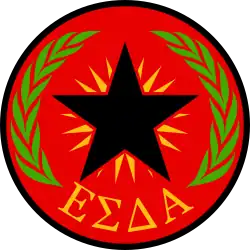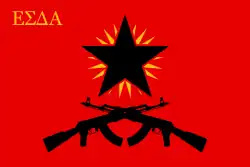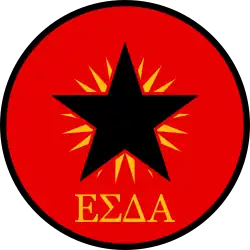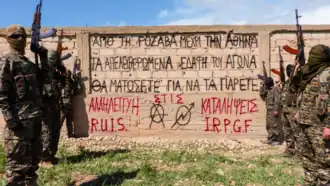Revolutionary Union for Internationalist Solidarity
| Revolutionary Union for Internationalist Solidarity | |
|---|---|
| Επαναστατικός Σύνδεσμος Διεθνιστικής Αλληλεγγύης | |
 Emblem of the RUIS | |
| Dates of operation | April 2015 – present |
| Active regions | |
| Ideology | Anarchism Anarcho-communism |
| Political position | Far-left |
| Status | Active |
| Part of | |
| Allies | |
| Opponents | |
| Battles and wars | |
| Colours | Black Red |
| Flag |  |
| Insignia |  |
| Website | |
The Revolutionary Union for Internationalist Solidarity (Greek: Επαναστατικός Σύνδεσμος Διεθνιστικής Αλληλεγγύης, abbreviated as ΕΣΔΑ or RUIS) is a Greek anarchist military unit involved in the Syrian Civil War. It was founded in 2015 and joined the International Freedom Battalion (IFB).
Establishment

Following the outbreak of the Syrian Civil War, in 2012, the autonomous region of Rojava was established in northern Syria, where the Kurdish-led People's Protection Units (YPG) fought against the Syrian Arab Republic and the Islamic State.[3] Many Greek anarchists volunteered to fight for the YPG, seeking to gain experience in guerrilla warfare and apply their tactics back in Greece.[4] In 2015, Greek anarchists and anarcho-communists established the Revolutionary Union for Internationalist Solidarity (RUIS), as a specifically anarchist military unit.[5]
It joined the International Freedom Battalion (IFB), an organisation of left-wing foreign volunteers established in June 2015, which fights alongside the YPG.[6] The RUIS was a later addition to the IFB, which was initially predominated by Turkish Marxist-Leninist organisations.[7] In May 2017, the RUIS made a statement declaring it would spill blood "from Rojava to Athens",[8] which caught the attention of the Greek authorities.[3]
Death of Haukur Hilmarsson
In early 2018, one of its fighters, the Icelandic anarchist Haukur Hilmarsson, was killed by the Turkish Armed Forces during the Turkish invasion of Afrin.[9] In its announcement of his death, the RUIS declared that he had "become immortal" and that his example had inspired them to continue their "resistance against fascism and tyranny".[10] In response, the RUIS called for attacks against assets of the Turkish state in Greece. The following year, far-left groups affiliated with the RUIS attacked the Turkish consulate in Thessaloniki and set fire to a Turkish diplomatic vehicle.[11]
See also
- Anarchism in Syria
- Rojava Revolution
- International Freedom Battalion
- International Revolutionary People's Guerrilla Forces
References
- ^ "In #Tabqa we helped liberate a society imprisoned & controlled by fear & violence. But this tactic isn't unique to DAîŞ – it is used (1)pic.twitter.com/ufFAlT2xSG". @IRPGF. 11 June 2017. Archived from the original on 8 November 2021. Retrieved 15 June 2017.
- ^ Άννα, Νίνη (9 October 2017). "Έλληνες Αναρχικοί Στέλνουν Χαιρετίσματα από τη Ράκκα της Συρίας". Vice News (in Greek). Archived from the original on 7 July 2019. Retrieved 21 January 2018.
- ^ a b Vice 2017.
- ^ Öz 2023, p. 64; Vice 2017.
- ^ Orton 2017, p. 33; Öz 2023, pp. 58, 64.
- ^ Hatahet, Cengiz & Rashid 2019, p. 24; Koch 2019, p. 13; Orton 2017, pp. 32–33; Öz 2023, pp. 58, 64–65; Soner, Aslan & Kıyıcı 2017, pp. 24–25.
- ^ Orton 2017, p. 33; Orton 2018, pp. 165–166; Soner, Aslan & Kıyıcı 2017, pp. 24–25.
- ^ Orton 2018, p. 170; Vice 2017.
- ^ Jayakumar 2019, p. 20; Kompatsiaris 2019, p. 14; Öz 2023, pp. 64–65.
- ^ Kompatsiaris 2019, p. 14.
- ^ Öz 2023, p. 65.
Bibliography
- Hatahet, Sinan; Cengiz, Mehmet Emin; Rashid, Bedir Mulla (2019). The phenomenon of YPG transnational fighters in Syria (Report). Al Sharq Forum.
- Jayakumar, Shashi (2019). Transnational volunteers against ISIS (PDF) (Report). International Center for Study of Radicalization.
- Kompatsiaris, Panos (2019). "On the Heroisms of Today: Experience, Memory and Risk as Anti-fascist Politics in Contemporary Art". Third Text. 33 (3): 1–16. doi:10.1080/09528822.2019.1628447. ISSN 1475-5297.
- Koch, Ariel (2019). "The Non-Jihadi Foreign Fighters: Western Right-Wing and Left-Wing Extremists in Syria". Terrorism and Political Violence. 33 (4): 669–696. doi:10.1080/09546553.2019.1581614.
- Orton, Kyle (2017). The forgotten foreign fighters: The PKK in Syria (PDF) (Report). Henry Jackson Society. ISBN 978-1-909035-32-4.
- Orton, Kyle (2018). "The Secular Foreign Fighters of the West in Syria". Insight Turkey. 3 (20): 157–178. doi:10.25253/99.2018203.12. ISSN 1302-177X. JSTOR 26469849. Retrieved 20 July 2025.
- Öz, Volkan (2023). "Fighting Fire with Fire? An Assesment of the Potential Threats of Westerners Fighting against ISIS in Syria and Iraq". Savunma Bilimleri Dergisi. 1 (43): 51–74. doi:10.17134/khosbd.1085135.
- Schmidinger, Thomas (2024). "Kurdish Armed Liberation Movement or Ground Forces of the Global Coalition against ISIS? The YPG/YPJ and the Syrian Democratic Forces (SDF)". In Lohlker, Rüdiger; Ivanyi, Katharina (eds.). Agents of Violence. Brill. pp. 173–203. doi:10.30965/9783657794478_007. ISBN 978-3-506-79447-5.
- Soner, Bayram Ali; Aslan, Ömer; Kıyıcı, Hakan (2017). PKK's regional franchise of terror (PDF) (Report). International Center for Terrorism and Security Studies. ISBN 978-605-4619-47-4.
- Yet, Dağhan (2023). "Quick-Impact Approach in Information Warfare: Turkish Experience". In Ateş, Barış (ed.). Military Innovation in Türkiye. Routledge. pp. 188–202. doi:10.4324/9781003327127-10. ISBN 9781003327127.
- "Greek Anarchists Are Helping Kurdish Forces Fight ISIS". Vice News. 2 June 2017. Retrieved 20 July 2025.
Further reading
- "EÖT savaşçısı İzlandalı Haukur Hilmarsson şehit düştü" [IFB Icelandic warrior Haukur Hilmarsson fell as martyr]. ETHA (Etkin Haber Ajansı) (in Turkish). 6 March 2018. Archived from the original on 6 March 2018. Retrieved 6 March 2018.
- "Ελληνες αναρχικοί πολεμούν κατά του ISIS στη κουρδική περιοχή της Συρίας, Ροτζάβα- Τι λένε οι ίδιοι μέσα από κείμενα και συνεντεύξεις τους". Press Publica (in Greek). 25 May 2017. Archived from the original on 3 November 2021. Retrieved 2 November 2021.
- Stelinsky (27 October 2015). "Ανταπόκριση από την Επανάσταση στη Ροτζάβα". ΑΠΑΤΡΙΣ Εφημερίδα Δρόμου (in Greek). Archived from the original on 31 March 2022. Retrieved 2 November 2021.
- "Ελληνες αναρχικοί πολεμούν κατά του ISIS στη κουρδική περιοχή της Συρίας, Ροτζάβα- Τι λένε οι ίδιοι μέσα από κείμενα και συνεντεύξεις τους- Δημοσιογραφία για το δημόσιο συμφέρον". Press Publica (in Greek). 25 May 2017. Archived from the original on 3 November 2021. Retrieved 16 July 2017.
- "Έλληνες αναρχικοί πολεμούν τον ISIS στα εδάφη των Κούρδων στη Συρία (pics)". CNN (in Greek). 25 May 2017. Archived from the original on 17 June 2019. Retrieved 15 July 2017.
- Βασίλης Γ, Λαμπρόπουλος (25 May 2017). "Ομάδα ελλήνων αναρχικών στο «συριακό Κουρδιστάν»". To Vima (in Greek). Archived from the original on 5 November 2021. Retrieved 2 November 2021.
- "Έλληνες αναρχικοί πολεμούν τζιχαντιστές στο Κουρδιστάν". HuffPost (in Greek). 25 May 2017. Archived from the original on 31 December 2021. Retrieved 15 July 2017.
- "Έλληνες αναρχικοί πολεμούν τους τζιχαντιστές στη Συρία". The TOC (in Greek). 25 May 2017. Archived from the original on 3 November 2021. Retrieved 16 July 2017.